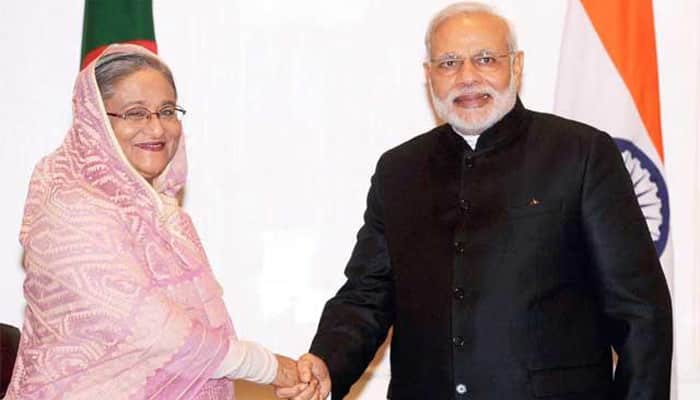Prime Minister Narendra Modi's visit to Bangladesh marks an important positive turnaround in the relationship between the two neighbours joined together by a shared past and culture.
Given PM Modi's keen focus on improving India's relationship with its neighbours, based on the principle of mutual trust and respect, his visit to Dhaka can turn out to be a win-win situation for both sides if they approach their ties on the right tangent.
The task is onerous given the long-standing unease between the two sides. Though India played a pivotal role in Bangladesh's independence, ties have been at best lukewarm for most part of their common history owing to a host of issues – that stemmed primarily from problems with sharing of water, and land disputes.
The seeds of the current good run in the ties between the two countries began with Sheikh Hasina of Awami league coming to power in 2009 – after years of frozen ties during the Khaleda Zia era.
The relationship gained further momentum in 2010 when the Bangladeshi PM visited India. It was followed by a return visit by the then prime minister Manmohan Singh in 2011. Pranab Mukherjee also made it a point to make Dhaka his first port of call after he was sworn-in as the President of India.
But more than India's keenness to mend ties with its neighbour, credit for the upswing in the sentiment goes to Sheikh Hasina.
Given the strong anti-India undercurrent in Bangladesh, her attempts to chart out a new path carried the risk of being dubbed as being too soft to India – the big, overpowering neighbour.
In this context, Prime Minister Narendra Modi has pulled off a big feat by getting the Land Boundary Agreement passed by Parliament, in agreement with West Bengal Chief Minister Mamata Banerjee. She will be present in Dhaka on June 6 to witness the signing of the agreement.
Hanging in limbo since in 1974, the non implementation of the land boundary pact, earlier known as the Indira-Mujib Treaty, was one of the biggest irritants between the two countries.
As per the LBA, Bangladesh will receive 111 enclaves (17,160 acres) from India’s possession and India will receive 51 enclaves (7,110 acres) from Bangladesh.
India may appear to have got a raw deal but in reality New Delhi is not focused on a cost-benefit analysis in terms of a few thousand acres of land. India has bigger concerns and, in that contest, LBA is a small concession.
An immediate gain would be a clear demarcation of the international border between the two countries, thereby allowing both sides to effectively curb trans-border terror.
India's security establishment has serious apprehensions on the threat posed by the unchecked borders with Bangladesh. The danger manifested recently in the way of the Burdwan blasts. Investigators later found that the elements inimical to India frequently cross over from Bangladesh to spread terror network in the country.
The issue of illegal migration remains a cause of worry for the Indian side. With vote bank politics over the issue being prevalent in Assam and Bengal, PM Modi will seek to tread cautiously on the matter.
India's strategic interest in Bangladesh is also a factor in New Delhi's plans to unlock the economic potential of north-east states. Landlocked, the seven sisters of north-east's only viable access to a port is the Chhittagong port in Bangladesh.
A friendly Dhaka may turn out to be a game changer for the fortunes of the much neglected part of the country.
Greater economic cooperation also makes sense between the two nations. While the bilateral trade is currently around $ 6 billion, Dhaka has reasons to be worried as the balance of trade is heavily skewed in favour of India. Sheikh Hasina would be expecting some positive movement on that front.
The other big dispute between India and Bangladesh has been over sharing of Teesta water.
With over 21 million people living in the Teesta river basin in Bangladesh as against less than 10 million in India, its water is crucial for the country, especially in the lean period from December to March when the water flow reduces drastically.
Manmohan Singh and Sheikh Hasina had come close to sign an agreement in 2013 - 50-50 allocation of water between the countries during lean season, 20% of the total flow to be left aside as environmental flow - before the UPA government bowed to pressure from Mamata Banerjee and deferred it.
While, External Affairs Minister Sushma Swaraj has admitted more work needs to be done on that front but some forward movement on the issue can be expected during Modi's visit.
Therein lies the most important aspect of the blossoming India-Bangladesh relationship. It is a factor of time and the political climate in Dhaka.
It is imperative India seizes the moment and solve all contentious issues with its strategic neighbour in a speedy manner.
History was not favourable, present is; future, as always, remains uncertain.
















